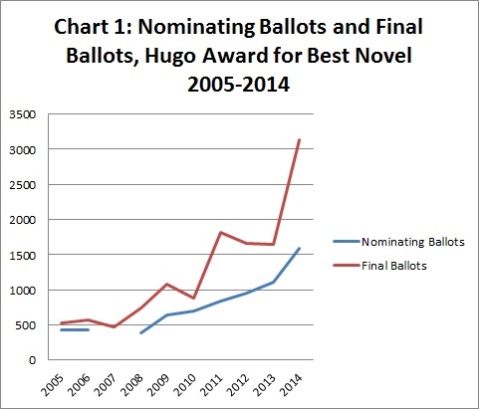How Many Nominating Ballots for the 2015 Hugo?
The turnout for the 2014 Hugo Award was unprecedented, with a huge jump in both nominating and final ballots. There are several reasons for that jump: London was a bigger than normal WorldCon city, and that certainly brought in more fans. Spokane in 2015 isn’t going to come close. The 2014 Hugo debate was also unusually vehement, with Larry Correia’s Sad Puppy campaign and the Wheel of Time‘s “whole series deserves a nomination” campaign drawing in an unusual number of supporters and protesters. All of that led to a near-doubling of the final Hugo Best Novel vote, from 1649 final Best Novel ballots in 2013 to 3137 Best Novel ballots in 2014.
That leaves a huge question open: how is that record turnout going to impact 2015? Remember, everyone who voted in 2014 is eligible to nominate in 2015. That’s a real oddity of the award, and it’s part of the reason the Hugo has a very repetitive flavor. Just consider: if you voted one book as best novel in 2014, aren’t you more likely to vote that same author again in 2015? Here’s the WorldCon rules:
3.7.1: The Worldcon Committee shall conduct a poll to select the nominees for the final Award voting. Each member of the administering Worldcon, the immediately preceding Worldcon, or the immediately following Worldcon as of January 31 of the current calendar year shall be allowed to make up to five (5) equally weighted nominations in every category.
While not everyone from LonCon3 will participate, the potential pool of nominators for 2015 is huge. Let’s do what Chaos Horizon does and look at some stats. First up, I data mined the Hugo Award website to come up with the number of nominating and final ballots for the Hugo Award over the past 10 years:
Table 1: Number of Nominating and Final Ballots for the Best Novel Hugo, 2005-2015

Frustratingly, I couldn’t find any data for the number of nominating ballots in 2007. The .pdf of that info only gives the number of nomination per book, not the total number of Best Novel ballots. If anyone has that data point, I’d love to patch up the chart.
Carryover is my awkward term for the ratio between Next Year’s Nominating Ballots divided by Previous Year’s Final Ballots. Since the last year’s Final Balloteers can vote in the next award, this ratio is what we need to predict the number of voters for 2015. Of course, not every voter from the past year will vote, and you can see a definite perturbation in the line based on location as well. Nonetheless, if we average those out, we can see that the number of nominees works out to be around 78% of the previous year’s final vote. Let’s just call it 75% for a ballpark. Imprecise, I know, but this will give us a start.
And visually:
That chart really shows how unusual 2014 was, but the general trend has definitely been towards more Hugo voters and more Hugo nominators.
What does that mean for this year’s award? Well, let’s tackle it from a couple of angles:
1. If we accept that 75% number, that would mean roughly 2350 nominating ballots for 2015. That seems huge, but even if you went with only 50% carryover, we’d have 1580, which is almost the biggest ever. If we land on a middle-ground number like 2000, that’s means each novel will need around 200 votes (10%) to make it into the final Hugo slate.
2. Each of the 2014 Hugo nominees (Leckie, Correia, Stross, Grant, Sanderson) has a sizeable built-in Hugo advantage for 2015. Let’s zoom in on Correia as an example: last year, 332 people voted Warbound as the Best Novel of 2014. If 75% of those nominate Correia again—as they’re fully eligible to do—that would likely get him into this year’s field. Sanderson’s case is even more interesting: 658 voters placed Wheel of Time in the #1 spot on their final 2014 ballots. Now, Sanderson isn’t Robert Jordan, but what percentage of those are going to support Words of Raidance? If we use that 200 bar I estimated above, that means Sanderson needs to keep only 30% of the WOT vote to make the slate. Doable? I don’t know.
3. A bigger pool of nominators might make it harder for lesser known authors to get into the 2015 field. In 2013, it only took Saladin Ahmed 118 votes to sneak into the final slate. In 2014, it took Mira Grant 98. That number could double for 2015. You’ll need either broad or passionate support to make the 2015 slate, something more niche novels might not be able to muster. It’s easy to imagine a 2015 scenario where Leckie keeps her vote, Correia keeps his vote, and Sanderson grabs a sizeable percentage of The Wheel of Time vote. That’s 3 spots already. Stross could keep his vote, or it could slide over to Scalzi (all S authors are interchangeable, right?). Grant is the borderline case. She was the lowest nominator and final ballot recipient of the bunch last year, and thus the most likely to drop off. In that scenario, the entire rest of the SFF world is fighting for one open Hugo spot.
One thing that makes the Hugo unusual—and interesting—are some of the oddities of its nominating and balloting practices. How is 2015 going to play out? Are we looking at a record turnout? And does a record turnout mean record repetition? Stay tuned . . . for more Chaos! (Insert laughter and more terrible jokes).
